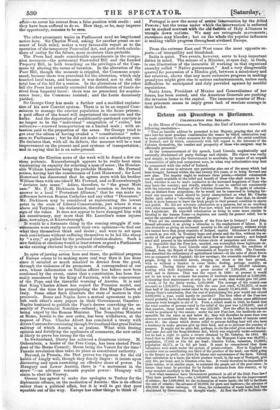The other prominent topics in Parliament need no lengthened notice
here. Sir Charles Wood; asking for another grant on-a& count of Irish relief, makes a very favourable report as to the operation of the temporary Poor-relief Act, and puts forth calcula- tions of outlay for the future, more moderate than probable.
The Peers had made considerable amendments in the compa- nion measures—the permanent Poor-relief Bill and the Landed Property Bill, in both trenching on the privileges of the Com- mons by altering the terms of taxation. In the alteration of the Poor Bill, though the measure is crippled, the Commons acqui- esced, because there was precedent for the alteration, which only touched local taxes, and because it was desired not to risk the total loss of the bill for a session. In the alterations of the other bill the Peers had actually extended the distribution of funds de- rived from Imperial taxes : there was no precedent for acquies- cence here ; the Commons resisted ; and the Lords decorously yielded. Sir George Grey has made a further and a modified explana- tion of his new Convict system. There is to be an unpaid Com- mission to manage the convict population in the home prisons; a paid officer of the board will superintend the convicts and the hulks. And the deportation of conditionally-pardoned convicts is no longer to be the "individual" emigration of "exiles," but collective— renewed transportation on a limited scale ; with at- tention paid to the proportion of the sexes. Sir George tried to get over the odium of having evaded a " constitutional " refer- ence to Parliament ; but he did not make out a satisfactory case. He declares that, with all its defects, the measure will be a vast improvement on the present and past systems of transportation ; and in saying that he is on safer ground.
























 Previous page
Previous page